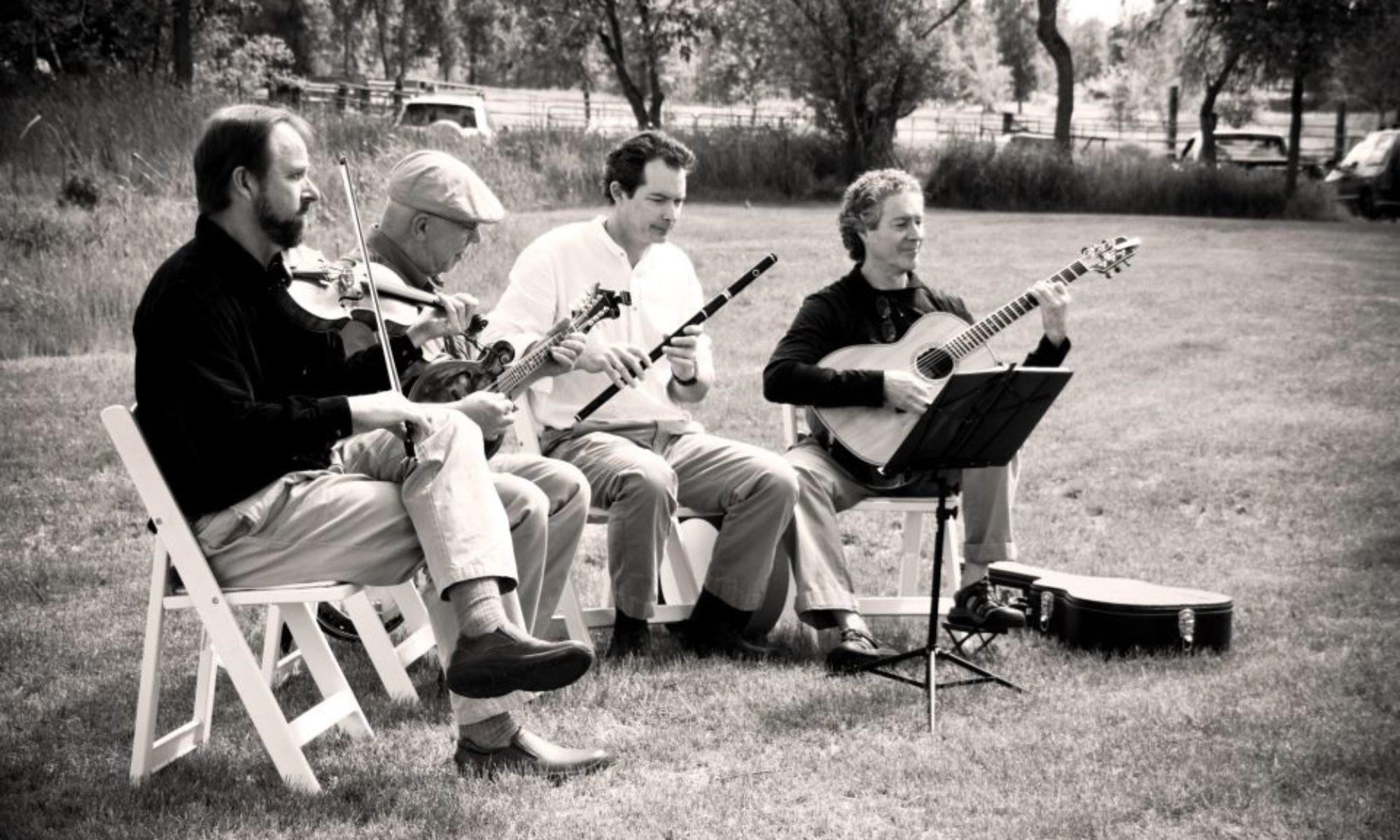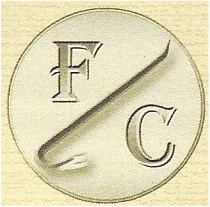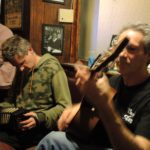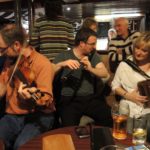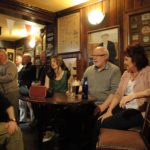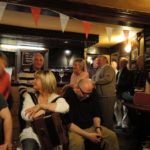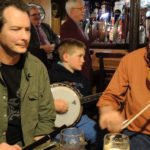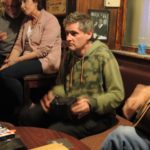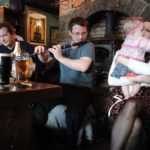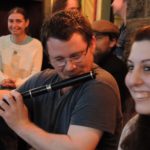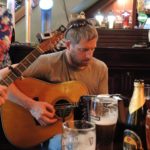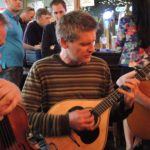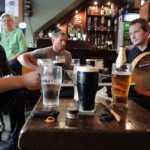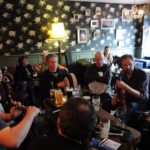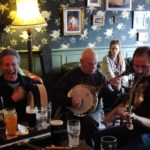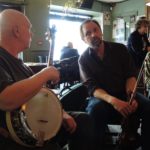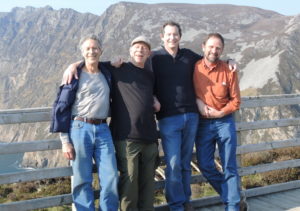Easter Sunday, April 20
We met Seamus in the small town of Ballisodare near 10:00 pm. Tunes don’t get going until late in the evening and that’s everywhere in Ireland. The fun starts late and ends late. Once you’re in the flow it feels no different than starting at 6:00 or 8:00, it’s just the way of it. We followed him and his girlfriend into Sligo and parked. As soon as we got out of the cars Seamus says that he wants to apologize for this pub, that it’s not always the best musical venue and the patrons aren’t always the best listeners, so he’s just warning us up front. We assured him that the whole experience is what we’re after and we can take it in stride; not to worry. So we walked around the corner and across the street to a roaring little pub, Foley’s, and crowded into a corner. This for me is the quintessential local Irish pub. It feels welcoming, a little dog eared, and friendly. This is where people meet and share stories and song, banter, joke and tell tall stories. Seamus introduced us to his mate Dave who plays guitar and we settled in, bought a round of pints and took stock of the scene. As we were unpacking instruments I looked over to see Seamus’ other musical partner Rodney. It turns out that Rodney plays concertina and bouzouki, his concertina was the first one I’ve seen pulled out at a session this trip and we were glad he did. He plays it beautifully and there was hardly a tune that was started that he couldn’t play and play it nicely. He’s a very solid player. If I got off track because of the noise I’d come back to Rodney. He kindly called out the keys on anything he thought we might not know. He’s also a very fine singer and delivered Paddy’s Lamentation with real pathos while accompanying himself on concertina. I love the song and he leaned over to tell me “no offense”. I told him none taken, that I loved the song.
For those reading that don’t know the song it’s a Civil War era tune written from the viewpoint of an Irish immigrant who gets swept up into the American Civil War, and told to fight for Lincoln and loses a leg for his trouble. He’s longing to return home and has seen enough war and trouble. Rodney did it as well as I’ve ever heard it done. Dave plays fine guitar. He uses drop D tuning which is the other tuning aside from that which I play, DADGAD that’s used in Irish Trad. John Doyle excels at the drop D which only lowers the low E string to D. I like it fine but found the left hand stretches just too much. It made my hand hurt, but Dave uses it well. He also has a lot of fine songs that he sings very nicely and I enjoyed listening to. Now to Seamus. He is an outstanding flute and whistle player. His father is P.J. Hernon and uncle is Marcus. He plays with that big, bold sound that cuts across the session. He has a command that only comes with decades of playing. I don’t know Seamus’ age but I’m guessing mid 30’s and he told me he’s been playing this session since he was 15. There are many sessions he plays, but this particular one he’s attended all that time. He, Dave and Rodney played some mighty sets that spanned 6 or more tunes and Seamus played utterly relaxed without a sign of strain or need for breath. It was fun being part of it and looking at the faces of the patrons who were really engaged in the music; impressed that some Yanks were sitting in and keeping up. As the night gathered speed so did the session. I looked up to see a very young fellow sit behind James and Morgan holding a banjo. His name is Patrick and he’s 11 years old. Rodney asked him to start a tune and by God he played really well.
Here is a huge distinction between the USA and Ireland. Patrick is shouldered up with the rest of us, his drink of choice is lemonade and he’s absorbing the tunes and atmosphere and playing his instrument. I didn’t see his soul being stained, or his trying to sneak a drink or being anything other than an 11 year old boy who loves the music. It was touching to see. His parents were over in a corner listening, proud of their young boy, as they should be. There was also a young girl sitting in one corner, about the same age, who was really engaged in the music as well. He started quite a few tunes and was a patron favorite as well as with us. At one point a man I’ll name Michael (I think that was his name) led a song The Rattling Bog. It’s one of those songs where you keep adding the subject of the previous verse to the current one and it gets longer and longer. Michael was hilarious and enthusiastic and we were all laughing. We were out on the sidewalk having a break and Seamus asked what we were doing tomorrow. This is always a good sign, it could just as easily be, ” it was nice meeting you, have a fun rest of your vacation “. James mentioned that we were looking at a session at Carrick on Shannon at Liam Cryon’s and both Seamus and Rodney said , no, no, no you must come to our session tomorrow afternoon. Seamus said, ” look, I don’t want to say that you won’t have a good session there, there’s a fine box player, but the craic will be better here”.
Now a short exposition on CRAIC. Craic is one of those terms that has many meanings. It can mean great atmosphere, great music, great banter, great fun, great jokes, great interaction, but it alway implies great fun and feeling. Despite the warning the session was great, and Seamus told me it was because we were part of it and offered the patrons a very different experience, that they were so used to what the three of them usually offered. As we were leaving various patrons were clapping us on the shoulder and shaking our hands and saying, “See you tomorrow”, So we’re off to an early session with Seamus and the lads at a different pub at 5:00 (early) and then if we wish back to Foley’s for another. Here we go, hold onto your hats and button your coats; we’re off to more good craic!
I wrote this poem inspired by our night with Seamus and company.
SEAMUS
He leans into it, the Grenadilla cylinder perched on his shoulder
Like some sinuous note spouting black snake.
His eyebrows arched and fingers tap, tap, tapping
A musical sketch that cuts through the stout and conversations.
He glances at me with a roll of the eyes and tuck of chin
And sprays a flurry of dancing tones across the pub.
I follow them with my eyes and ears while my fingers on the strings
Do their best to place a frame around the picture he is drawing.
All of us add to it and soon there is a fine topography to view.
Here’s the village where the tune came to life
And the road it travelled from there to here.
The small stream and the bridge across it and the cross where it turned north.
And every pub and session it was shared in and
All the many, many hands that burnished it aglow.
Until it came to this place, this moment where we polish it anew.
Such it is, these tunes. They weave through the land and streams
Take flight with the birds; anoint the ears of all those that listen,
And we look at the map anew each time we play
Never following the road the same way twice.
Rick Rubin 2014
